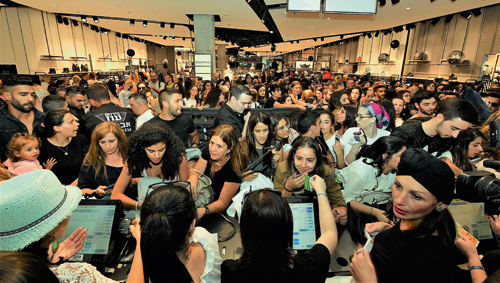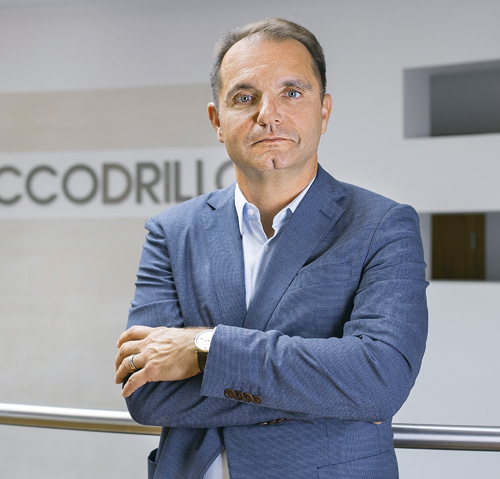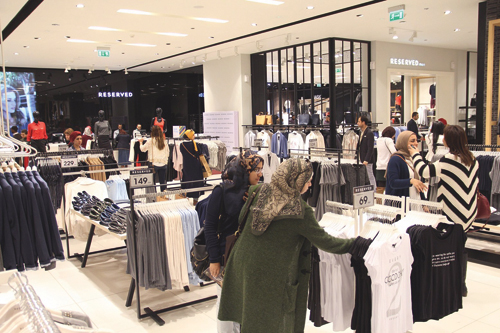Polish brands go global
Retail & leisure
Foreign expansion is both the manifestation of an appetite for risk and a business necessity. The domestic market is too small for many Polish companies to grow so they are taking their products abroad where they are having more and more success. These companies include some of the most active clothing and footwear retailers, including CCC, LPP, Kazar, Wojas and Coccodrillo. Today these companies have invaded countries on nearly every continent, including Europe, Asia and Africa. Global expansion represents an opportunity for Polish companies to develop. But it also creates a number of challenges.
A debut a year
In mid-August this year, Polish clothing manufacturer LPP officially opened its first Reserved store, which is its flagship brand, in Tel Aviv. The company is currently one of the fastest growing fashion retailers and manages five brands: House, Reserved, Cropp, Mohito and Sinsay. LPP first ventured abroad in 2002, when it appeared in the Czech Republic, Russia, Hungary and Latvia. A year later, Reserved opened stores in Ukraine, Lithuania and Slovakia. Later Cropp stores were opened in Estonia, Slovakia, Latvia, Russia, Lithuania and the Czech Republic. In 2008, LPP acquired Artman, which was the owner of the House and Mohito brands, and as a result became the largest youth fashion chain in Poland as well as an important international player. LPP is still planning to enter new foreign markets, and the most important goal that it hopes to achieve through its international debuts is to build up global recognition for its brands. The company intends to open at least one store in a new country every year. This year was no exception. “We opened our first stores in Israel, Slovenia and our 20th Reserved store in Germany. Next year we are to extend our brick-and-mortar sales chain to Finland as well as to Bosnia-Herzegovina,” reveals Przemysław Lutkiewicz, the CFO of LPP.
After such rapid expansion, LPP now has more retail space in its stores abroad than it does in Poland with its foreign sales accounting for as much as 46 pct of its total revenues. “We expect that next year this will be the other way around and revenues from foreign sales will exceed those from our stores in Poland,” predicts the company’s CFO. LPP also intends to debut this year in Kazakhstan.

LPP officially opened its first Reserved store, which is its flagship brand, in Tel Aviv in mid-August
Success on several continents
Polish children’s clothing brand Coccodrillo has also been expanding axross the global market for a number of years. At the end of 2017 it had 250 stores in Poland including franchises and 140 in Europe, of which 116 were in the EU. The brand currently has stores in Romania, Bulgaria, the Czech Republic, Russia, Serbia, Mongolia, Egypt, Saudi Arabia, Libya, Oman, Brazil, Slovakia and Lithuania. The company has ambitious plans to further expand into sub-Saharan Africa and currently intends to increase the number of its foreign stores to almost 160 in Europe and 131 outside the EU. This creates another challenge for the company. The company’s growing sales chain is forcing it to update its IT systems. “Since the foundation of the company, we have focused on foreign expansion. We first started exporting goods in 2002 and a year later we started working with our first foreign partners. Our brand has clothing stores in almost 30 EU countries, as well as in Asia, Africa and South America. We have also recently started selling clothes in Slovenia and Nigeria. Foreign retail is a very important part of what we do because it currently generates a total of around 30 pct of our revenues,” explains Marek Dworczak, the CEO of CDRL, the company that owns the Coccodrillo brand. CDRL is also working hard to improve its online sales and is building a warehouse for servicing foreign e-commerce customers. This year the company started working with MyToys (which is a 17-store chain of toy stores owned by the German-based Otto group) and as a result opened its first store in Lüdenscheid at the beginning of February. This also represents the company’s debut on the German market. “We have established a partnership in Germany because we want to expand our activities. We hope that the Coccodrillo brand will soon open in other cities and towns in Germany. We are negotiating with potential partners from Armenia and Georgia, the effects of which you should see next year,” announces the CEO of CDRL.

“We have also recently started selling clothes in Slovenia and Nigeria,” says Marek Dworczak, the CEO of CDRL
Looking to the UAE
Kazar, a producer of shoes, handbags, leather goods and accessories, is also expanding abroad. The brand first ventured abroad in 2013, when it opened its first store in Romania. Since that time it has opened stores in the UAE, in Bahrain and in Hungary. The brand has stores in Bahrain City Center mall in Manama as well as in the Mirdif City Center mall in Dubai. The range of goods it sells has been specifically tailored to meet the demands of UAE customers. Kazar is also expanding rapidly in Europe. “We are going to open a store in the Nový Smíchov centre in Prague later this year. Hungary is the next European market that we are going to focus on,” says Katarzyna Gorzała a marketing specialist at Kazar. The company is continuously looking for development opportunities in other markets. Its international expansion strategy is to franchise its brand in foreign markets. The company also has an online store from which it sells to other countries in the European Union.
Big plans for CCC
CCC is also expanding abroad. It is currently one of the largest footwear retailers in Central Europe, with more than 950 stores across 20 countries. The company sells shoes in such countries as Hungary, Slovakia, the Czech Republic, Austria, Croatia, Slovenia, Bulgaria, Germany, Serbia, Russia, Latvia, Lithuania, Ukraine, Romania, Kazakhstan and Estonia and it is still looking to enter new markets. At the beginning of the year it signed a franchise agreement with Apparel Group, which is a franchisee for such global brands as: Calvin Klein, Tommy Hilfiger, Aldo, Skechers, New Balance and Crocs. The agreement is for footwear to be sold in six countries in the Middle East including Saudi Arabia, the UAE, Kuwait, Oman, Qatar and Bahrain. The agreement has a ten-year term with the option to be extended for a further ten. “We have found a reputable partner who will guarantee our success on markets that have almost 50 mln consumers and where we see the possibility to open around 200–400 stores,” claims Dariusz Miłek, the CEO of CCC. The company plans to open its first stores in 2019 and their number is set to grow to 60 with a combined area of at least 40,000 sqm by 2023.
The company is also expanding across Western Europe. In May this year it bought a majority stake in Swiss shoe maker Karl Voegele, a company with almost 100 years of tradition.

Reserved also has a store in Egypt
Knickers to everyone
Many Polish companies are expanding onto foreign markets but only a few of them use franchising. One company that is expanding through local partners is Esotiq & Henderson of Gdańsk, which sells lingerie and clothing, The company has no doubt as to the promise of the markets in Belarus, Ukraine and Russia. “We’ve decided to develop our Esotiq and Femestage franchise chains in Ukraine and Belarus. Our brands are well known in the East. These are large markets where there is a lot of demand for underwear and clothing,” says Adam Skrzypek, the CEO of Esotiq & Henderson. The company currently has 23 franchise stores in Ukraine, Belarus and Moldova. In November the company is to debut in Novosibirsk in Russia. And in Q1 2019 it will open in Astana in Kazakhstan. Esotiq & Henderson is also present in Germany, where it has nine stores. On top of that, the company is also investing in its online sales channel. Its Esotiq.com platform is available in twelve languages.
To be or not to be – an international company
Why are more and more Polish brands deciding to expand abroad? Those that are expanding openly admit that there is no extra room for them on the domestic market and foreign expansion is a way for them to grow more. According to research by Citi Handlowy’s Kronenberg Foundation, “The main reason for a company to enter foreign markets is to increase its revenue. More than half of the companies we surveyed considered this to be their main motivation. Every fifth company stated that what was important was to increase the size of its operations and win new customers,” points out Grzegorz Dąbrowski, the head of the corporate banking division at Citi Handlowy.
This is confirmed by Marek Dworczak of CDRL. In his opinion, the benefits of foreign expansion include the higher revenues from stores operating abroad. “Since our company was established, we have known that we would go on to expand onto foreign markets. This also gives us the status of an international company which helps us when negotiating new contracts, since we are a more credible partner for other companies and we promote Polish goods abroad,” he adds.
According to Agnieszka Górnicka, the CEO of market research firm Inquiry, foreign expansion can increase the turnover and size of a business but also its risk. “Russia and Ukraine have both been attractive markets for many years. However, the unexpected war in Ukraine and the introduction of sanctions have put an end to the period of prosperity, and this led to the bankruptcy of Polish lingerie chain Atlantic,” she explains. “Polish brands can compete effectively with international brands because they have a better understanding of local markets and can adapt their product range for Central European consumers, which is a difficult hurdle for many companies from Western Europe and the US,” insists the CEO of Inquiry.
Polish companies are now starting to expand to other markets in Western Europe as well as to Asia and America and this is a real challenge with difficulties such as problems acquiring locations, higher rental rates and more demanding consumer requirements. “Because of this, entering mature markets is only possible for the largest Polish companies. Brands such as Reserved and CCC are able to jump over such barriers,” says Agnieszka Górnicka.
According to Grzegorz Dąbrowski, Polish businesses do not have any hang-ups and they are ready to compete on price and quality. These days invading foreign markets has a new dimension, especially in the era of the internet, which allows foreign companies to enter foreign markets much more quickly. ν
Inglot from Poland plays hardball with the big boys
In June 2013, Inglot, a cosmetics store from Przemyśl, opened a store in Times Square, where it mounted ad hoarding next to such brands as Coca-Cola, Disney, Kodak, Korona and M&Ms. The advertisement was installed on the birthday of its founder, Wojciech Inglot, who had, however, died a few months earlier. The brand began its global expansion in 2006 and today it has stores in over 70 countries around the world. The company chooses prestigious locations such as New York and Las Vegas. One of the reasons for the company’s success is its ability to adapt to market needs. The company has launched its O2M breathable nail varnish, which was awarded a halal certificate and was a hit with Muslim women. It also sells a wide range of cosmetics for darker complexions. However, the most important reason for its success is its large range of colours, with over 2,000 different shades.





















































